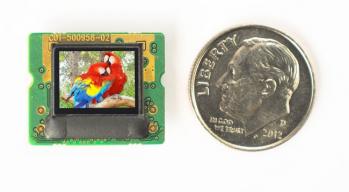eMagin reports preliminary Q4 2021 financial results
OLED microdisplay maker eMagin posted its preliminary financial results for Q4 2021. eMagin sees increased product revenues in the range of $6.8 to $7 million (up 10% to 13% from Q4 2020). Contract revenues were about $0.2 million (down from $1.5 million in Q4 2020).

eMagin says that its core military business is enjoying a ramp up in volume, and the company's backlog at the end of the year increased 26% from the end of 2020. The lower contract revenues were primarily due to timing of development work for a tier-one consumer customer, but eMagin continues to work on this project and anticipates ongoing contract revenue with this customer.
eMagin reports mixed Q3 2021 financial results
OLED microdisplay maker eMagin reported its financial results for Q3 2021. Revenues were $5.8 million in the quarter, down from $7.3 million in Q3 2021. Operating loss in the quarter was $3.3 million (down from $1.9 million in Q2 2021).

eMagin says that during the quarter it continued to grow its ENVG-B program revenues and also its medical customer revenues, but in total its revenues decreased due to timing issues of certain military orders, and also $1.3 million in shipments were delayed to Q4 due to to production issues and unexpected manufacturing tool downtime.
eMagin unveils a 10,000 nits dPd WUXGA OLED microdisplay prototype
OLED microdisplay maker eMagin has been developing direct-emission OLED microdisplay (also called directly-patterned, or dPd) for many years, and the company today unveiled a new WUXGA (1920x1200) dPd microdisplay prototype. The new display offers a brightness of 10,000 nits, which makes it (according to eMagin) the world’s brightest high-resolution full-color OLED microdisplay.

eMagin says that using direct patterning instead of color filters enabled it to improve the brightness 20-fold, compared to its typical XL microdisplays, and 3-4X compared to its brightest XLE microdisplays.
Is Facebook planning to use eMagin's dPd OLED microdisplay in its next-gen VR or AR device?
OLED microdisplay maker eMagin has been developing direct-emission OLED microdisplay (also called directly-patterned, or dPd) for many years, and is considered to be the leading company - the closest one to commercialize such a display. A dPd will enable much higher efficiency/brightness compared to current designs based on color filters.

In the past eMagin reported of several leading companies that have licensed the technology and/or are working with the company towards the design of custom dPd OLED displays for future AR/VR products. In 2017 for example eMagin reported of a Tier-1 CE company that licensed its dPd tech, and in 2020 the company said it started a new consumer-related AR development project for a next-generation display for a Tier-1 customer.
eMagin reports mixed 2Q 2021 financial results
OLED microdisplay maker eMagin reported mixed quarter results for Q2 2021. Production issues and unexpected manufacturing tool downtime reduced revenues, but the company says it increased shipments to military, medical and other customers. Revenues in the quarter were $6.3 million (down from $7.7 million in Q2 2020). Net loss in the quarter was $0.3 million (but this includes a $2.6 million non-cash profit due to change in value of a warrant liability).

eMagin says it continued to make steady progress on the direct-emission microdisplay project, and remains on schedule to produce full-color prototypes this year. eMagin also reports it is ramping up production of its latest XLE technology (which still uses color filters) and has closed a major design win with a military customers for XLE OLED microdisplays.
eMagin reports its financial results for Q1 2021
OLED microdisplay maker eMagin reported its financial results for Q1 2021. Revenues were $6.8 million up from $6.7 in Q1 2020. Operating loss was $2 million, up from $1.3 million in Q1 2020. Net loss was $7.4 million (including a $7.2 million warrant value loss).

At the end of March 31 2021, the company had $10.7 million in cash and equivalents. eMagin reports it is continuing to place down payments for equipment as part of the $39.1 million US government funds that were awarded last year to enhance its manufacturing capabilities in the US.
eMagin reports its financial results for Q4 2020
OLED microdisplay maker eMagin posted its financial results for Q4 2020. Revenues for the quarter were $7.7 million (up from $7.3 million in Q3 2019) with contract revenue of $1.5 million reflecting continued work for a Tier-1 consumer company.
Net loss for Q4 2020 was $3.7 million. For the full year 2020, eMagin reports revenues of $29.4 million, up from $26.7 million in 2019. The net loss in 2020 was $11.5 million.
eMagin reports its financial results for Q3 2020
OLED microdisplay maker eMagin posted its financial results for Q3 2020. While the company had a strong quarter in its main military market, but eMagin total sales were lower than expected as the medical and commercial markets were effected by the COVID-19 pandemic.

eMagin reports revenues of $7.3 million, a decline of $0.6 million from Q3 2019. Net loss for the third quarter of 2020 was $3.5 million compared to a loss of $0.3 million in 2019. At the end of the quarter, eMagin had cash and equivalents worth $10.3 million. The company's backlog at the end of the quarter was $10 million.
eMagin reports its financial results for Q2 2020
OLED microdisplay maker eMagin announced reported its financial results for Q2 2020. Revenues reached $7.7 million, an increase of 44% from Q2 2019. Operating loss was $1.3 million (down from $2.8 million in Q2 2019).

eMagin says it continues to see strong demand for its microdisplays in the military market, and also in the medical market. At the end of the quarter eMagin's backlog was $13.3 million of products to be shipped in the next 12 months. Cash and equivalents at the end of the quarter were $11.5 million.
A look into eMagin's AR/VR dPd technology
In 2012, we first heard that eMagin is developing direct emission (or direct patterning, as the company calls it) OLED microdisplays. Fast forward into 2020, and the company is aiming to soon start producing such displays (it already launched its first such panel, see more below). In this article we'll look into the technology and the latest updates from eMagin.

All current OLED microdisplays on the market from all producers use a white OLED with color filter. This is a simple design, but it is wasteful in energy, as the filters block around 80% of the light, and in addition to achieve the white color one needs to use a blue OLED emitter (in addition to a yellow one, or red and green ones) - and blue is the least efficient color for OLED emission.
Pagination
- Previous page
- Page 3
- Next page



